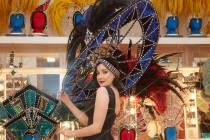Nevadan at Work: Cirque du Soleil exec in charge of ‘making people happy’
On any given day, Jerry Nadal could be in Brazil, Germany or Australia.
Or, he could be taking meetings in his home office in Las Vegas.
As vice president of resident shows for Cirque du Soleil, Nadal often travels to conferences and meetings on other continents, and says England is his favorite country, purely for the history. Beauty-wise, Nadal says Thailand wins, "hands down."
"They're the nicest people I've ever met. They're welcoming, open and very sweet."
In Las Vegas alone, Cirque employs 1,600 people from 40 different countries who create seven shows, with one on the way. Worldwide, there are about 5,000 employees and 21 shows.
Next year, the permanent show, "Michael Jackson: The Immortal," is opening at Mandalay Bay. Later this year, "Viva Elvis" is closing and "Zarkana" is moving into its space at Aria. Per production, anywhere from 75 to 300 people are employed.
"The technical parts of the show determine the size of the cast and crew. The average size for us is 75, give or take," Nadal said. "I don't know that I could go back to working for a company with just all Americans. It's been fascinating. It's like running the U.N., but it works."
Born and raised in Brooklyn, N.Y., Nadal still keeps an apartment in Manhattan, but has called Las Vegas his full-time home since 2003. He first came to Southern Nevada in 1993 to work on "Starlight Express," but after accepting a position with Cirque, began his world-traveling ways.
Before his life became enmeshed in the business of packing theater seats and managing stages, Nadal worked briefly in the financial industry.
At the same time, he volunteered in community theater, mainly behind the scenes although he did dabble in some acting.
"It was very obvious where my talents did not lie," Nadal said with a laugh.
Quickly, he tired of the financial industry and knew he had to follow his passion for the world of entertainment.
"I just realized being at the bank in that whole ultimate corporate thing wasn't for me, so I just left," Nadal said.
He landed his first theatrical job with Equity Theater in New York, making a per diem of $5 a day.
"My parents thought I was crazy," he remembered.
These days, he's in charge of one of the most well-known entertainment companies in the world, and says he's loving every moment, because he's "in the business of making people happy."
Question: What does it cost to create a Cirque show?
Answer: There are costs on the partners' side and costs on our side. If you look back when we created "Ká" eight years ago, the theater and the show was about $165 million.
If you're looking at a permanent show that's from scratch with a custom-built theater you're, right now, in today's dollars, in the $150 million range, which is why we're very selective about who we partner with and where we put the show, because not everywhere can support and sustain something this big.
That's why Las Vegas is fantastic. It's the perfect model. The constant flow of tourists coming through and there's always new people coming in. It's the perfect scenario.
Question: Who is the typical Las Vegas Cirque customer?
Answer: Our pricing goes from $49 to $155 so we really try to span out and attract as many people as possible. But, I think the Cirque customer in general is in that 29-54 age range.
We skew more heavily toward women than men and people that are more affluent, college educated, that tends to be our core audience.
Question: How do you market to that audience?
Answer: We work with the properties. Here, you have a built-in audience. In MGM, you have 4,000 hotel rooms so you've captured the audience here, same with every other property.
I think word-of-mouth sells the shows, PR (public relations) has a huge impact. You won't automatically see a big bump in sales but it becomes an awareness factor so that when people come here, it's top of mind.
We also do a lot of work with the travel and tour operators to try to get people to book in advance, because once you get here, your options just explode.
Question: What is your work life like?
Answer: My meeting schedule is packed. Different people want to meet with me, whether it's employees or others.
Everything we do in this branch of the company is partnerships. We have six shows with MGM (Resorts International). "Mystére" is now with (Treasure Island owner Phil) Ruffin.
If you look at "Viva Elvis" we've got CKX, which owns the rights to Elvis' likeness and image, and we have Elvis Presley Enterprises, which works with CKX to ensure all of that.
With "Love" we have Apple (Corps.)
There's a lot of people with a lot of competing interests, so there's a lot of meetings.
Question: How do you work to form solid business partnerships?
Answer: In this business, a lot of it is based on personal relationships and reputation.
I think the company overall has a great reputation and Guy Laliberte, the owner of the company, has a lot of individual relationships.
For "Love," the way the Beatles relationship started was he had met George Harrison in Montreal at an F1 race. They both were passionate about Formula One racing. ...
We got a call from the Michael Jackson people when he passed away that the people who were managing his estate were looking at doing a live show based on his music, so we jumped in to that right away.
It's dealing with the family and the people who manage the estates.
Question: How are the occupancy rates on the shows?
Answer: Very good. We're having a good run. I think the hotels' business has picked up.
Last year "O" ran at 98 percent occupancy. It's been our consistent performer, even through the economic downturn.
What's changed is that the booking window has gotten a little bit tighter. It still sells out, but it sells out a month in advance as opposed to three months in advance. That reflects people making last-minute choices when they travel.
Across the board, all the shows run at about 85 percent occupancy.
Question: Who was your mentor in business?
Answer: There have been many people in my career. I wouldn't say it's any one person, but I've worked with some really great people in many different industries.
I saw, from a management perspective, what worked and what didn't work, so I've tried to take a little bit from each.
I think no matter what your age, if you're a manager, it's always a learning experience.
You should always be able to change.
Contact reporter Laura Carroll at lcarroll@reviewjournal.com or 702-380-4588.
VITAL STATISTICS
Name: Jerry Nadal
Age: 52
Quote: "It's like running the UN, but it works."
Position: senior vice president of resident shows, Cirque du Soleil
Family: domestic partner Gene Lubas, and twin sons Harrison and Wilson, 5 years old
Education: associate of arts and bachelor of science in management from St. John's University, 1981; MBA from University of Phoenix, 2005
Work history: financial analyst for U.S. Shipping Lines, worked in the marketing department for Chase Manhattan Bank, stage manager for Equity Theater, stage manager with Troika Entertainment, production manager for "Starlight Express," 1993; company manager for a production of "Grease," began working with Cirque du Soleil on "Alegria" in 1998, then moved around the world working on various Cirque shows before becoming company manager for Ka, general manager for all Vegas shows, then promoted to current position
Hobbies: reading, travel, history and spending time with his twin boys
Favorite book: The most recent book I read was a biography on "Catherine the Great."
Favorite movie: "It's a Wonderful Life"
Hometown: New York City
In Las Vegas since: 1993
Cirque du Soleil is at 980 Kelly Johnson Drive, Suite 200, Las Vegas and can be reached at 702-352-0200




























